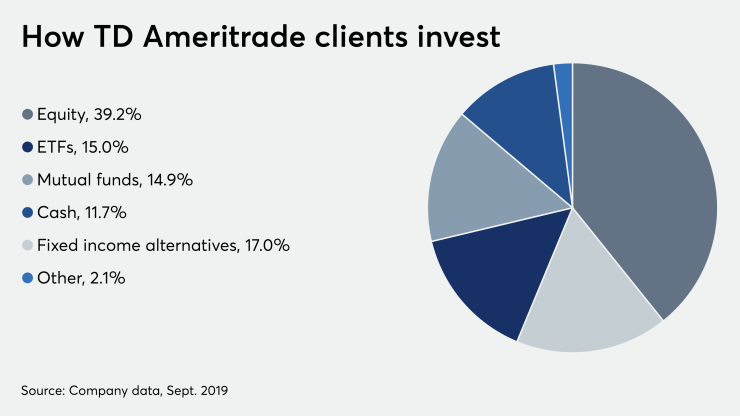Three major retail brokerages have a simple message for analysts after announcing — all in the same month — they dropped commissions on ETF, U.S. equities and options trading.
It’s going to be fine.
Some analysts and industry watchers aren’t so sure, however, and they made their skepticism clear on the companies’ earnings calls following the release of their latest quarterly financial results.
In the last two weeks, analysts piled questions on
“A lot has changed since we last spoke three months ago,” said Walt Bettinger, CEO of Schwab, as he began his prepared statements.
On TD Ameritrade’s earnings call Oct. 22, Tim Hockey humorously declared he would keep count of how many questions he was asked about M&A. (For the record, he got six.)
FOLLOW THE LEADER?
Convincing analysts that the new zero-commission world will put custodians in a better position in the marketplace proved a hard sell.
With the Fed cutting interest rates twice this year, and the 10-year Treasury yield edging toward an all-time low, brokerages scratched commission revenue “precisely when the markets look least robust,” Michael Pizzi, CEO of E-Trade, said on the company’s earnings call Oct. 17.
So why now?
In the case of Schwab, the industry titan that ignited the commission price war earlier this month, it was all about staying ahead of the competition.
“I do want to be crystal clear — we are on offense here at Schwab,” Bettinger said on the call. The San-Francisco-based company had been predicting commissions would bottom out for a decade, he said. “We thought we would actually be in a stronger position after all the online competitors followed us to zero,” Bettinger said.
The fact that Interactive Brokers, a brokerage and custodian with $139 billion in client equity, dropped commissions on its retail platform five days before Schwab’s announcement, “was not a weighing factor to our decision,” Bettinger said.

TD Ameritrade’s board convened within approximately six hours of Schwab’s announcement, Tim Hockey, CEO of the Omaha-based brokerage and custodian, said on his company’s call.
After crunching the numbers, the company had earlier concluded that once price tags at competitors fell below $2 or $3 — and especially when major competition got to zero — “then it is pretty much game over,” Hockey said.
The company matched Schwab’s offering within eight hours of its announcement, and made it effective four days before Schwab.
While Hockey allowed he wasn’t expecting commissions to fall as quickly as they did, he said it removed a barrier for TD, which had charged $6.95 per trade, while competitors like Schwab and Fidelity had been at $4.95.
“I can tell you our associates are incredibly thrilled to have the cloud of the price differential taken away,” Hockey said. In
E-Trade, which made its own commission-cut announcement two days after Schwab and TD Ameritrade, is not as enthusiastic.
“We did not favor this shift,” said Pizzi on the call, using words like “value-eroding” and “irrational” to describe the competitive moves that preceded E-Trade’s decision.
Nevertheless, Pizzi maintained the decision would improve E-Trade’s competitive position.
NAVIGATING REVENUE DROPS
The three brokerages and custodians are making adjustments they hope will make up for millions of dollars in lost revenue.
Schwab
Schwab is examining how it can further expand into advice as well as considering how it could boost profitability in its asset management division, according to Bettinger.
“We believe we’ve just begun to make inroads into the area of investment advisor abilities,” he said on the call, noting that while there have been modest levels of fee pressure, “there are still a lot of revenue opportunities there.”
Would the the custodian make RIAs start paying for service? “I would say at this time we do not have any plans to look to change the way RIAs compensate us for the custody and other services we provide,” Bettinger added.
The company will also seek to increase the percentage of revenue sharing it receives from asset managers, Bettinger said. (The company has already
TD Ameritrade is building out new services for high-net-worth RIA clients, such as charitable giving, trust accounting and cash management capabilities, Hockey said on the call.
The firm’s CFO Steve Boyle wrote in
On the retail side, TD will consider charging recurring fees for premium services and “episodic advice,” according to the prepared statements. The company is also looking to expand its stock lending and thinkorswim trading programs.
The company may also look to cash interest to boost its bottom line, albeit in the future. Hockey says the company will be able to renegotiate its bank deposit pricing in 2021 with TD Bank, which currently owns 43% of TD Ameritrade. That new arrangement would become effective in 2023.
To reduce annual expenses, E-Trade will leave its New York headquarters by the end of this year and fold into its New Jersey office, Pizzi said on the call.
Cash sweeps may also help E-Trade’s bottom line, according to CFO Chad Turner. At the end of this year, the company will have the option to sweep its premium savings deposits to third-party institutions.
“As of the end of the quarter, we have almost $12 billion of sweep deposits that are off balance sheet,” Turner said.
Another option would be selling certain services à la carte, such as tools, screeners and a “high level of market data access” that are currently free to all customers, Pizzi says.
All this adds up to a zero-commission race in full gallop. The question is: Who will end up the winner?
In the quarter ending Sept. 30, Schwab’s net revenue was up 5% year-over-year, TD Ameritrade’s was up 10% and E-Trade’s was up 6%.
Analysts predicted, on average, that
Bettinger noted on Schwab’s call: “Time will tell in terms of who will benefit most.”






